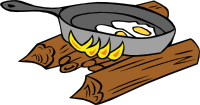Associations to the word «Fry»
Noun
- Onion
- Frying
- Steak
- Hamburger
- Sauce
- Salad
- Garlic
- Slice
- Potato
- Stir
- Pork
- Butter
- Batter
- Noodle
- Sausage
- Shrimp
- Flour
- Burger
- Bacon
- Stew
- Dough
- Chili
- Dish
- Snack
- Chop
- Beef
- Egg
- Pepper
- Soy
- Chips
- Barbecue
- Sandwich
- Tomato
- Cheese
- Dip
- Grease
- Pickle
- Vinegar
- Curry
- Platter
- Menu
- Bake
- Mutton
- Vegetable
- Soup
- Bread
- Carrot
- Dessert
- Chicken
- Mustard
- Oyster
- Seafood
- Cracker
- Paste
- Bun
- Pan
- Catfish
- Toast
- Pizza
- Mushroom
- Cuisine
- Boil
- Cucumber
- Cake
- Meat
- Fish
- Dripping
- Biscuit
- Clam
- Lemon
- Pea
- Bean
- Fat
- Broth
- Salt
- Rice
- Turnip
- Spice
- Cabbage
Adjective
Pictures for the word «Fry»
Wiktionary
FRY, verb. (transitive) To cook (something) in hot fat.
FRY, verb. (intransitive) To cook in hot fat.
FRY, verb. (intransitive) (colloquial) To suffer because of too much heat.
FRY, verb. (intransitive) (informal) To be executed by the electric chair.
FRY, verb. (transitive) (informal) To destroy (something, usually electronic) with excessive heat, voltage, or current.
FRY, noun. (usually in plural fries) (mainly Canada and US) A fried potato.
FRY, noun. (Ireland) (British) A meal of fried sausages, bacon, eggs, etc.
FRY, noun. (colloquial) (archaic) A state of excitement.
FRY, noun. (now) (chiefly UK dialectal) Offspring; progeny; children; brood.
FRY, noun. Young fish; fishlings.
FRY, noun. (archaic) A swarm, especially of something small (a fry of children).
FRY, noun. (UK dialectal) The spawn of frogs.
FRY, noun. A kind of sieve.
FRY, noun. A drain.
FRY, proper noun. A surname.
FRY BREAD, noun. Fry bread.
FRY BREADS, noun. Plural of fry bread
FRY COOK, noun. A cook who specializes in fried foods.
FRY SAUCE, noun. (US) A condiment for french fries, usually one part ketchup to two parts mayonnaise.
FRY UP, noun. (British) (idiomatic) a breakfast made of tomatoes, scrambled eggs, fried eggs, bacon, sausages, hash browns, baked beans, black pudding, chips, toast and mushrooms (or any combination thereof); full English breakfast
Dictionary definition
FRY, noun. English painter and art critic (1866-1934).
FRY, noun. English dramatist noted for his comic verse dramas (born 1907).
FRY, noun. A young person of either sex; "she writes books for children"; "they're just kids"; "`tiddler' is a British term for youngster".
FRY, verb. Be excessively hot; "If the children stay out on the beach for another hour, they'll be fried".
FRY, verb. Cook on a hot surface using fat; "fry the pancakes".
FRY, verb. Kill by electrocution, as in the electric chair; "The serial killer was electrocuted".
Wise words
The right word may be effective, but no word was ever as
effective as a rightly timed pause.

